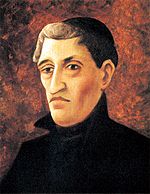Toribio Rodríguez de Mendoza, Date of Birth, Place of Birth, Date of Death
TweetToribio Rodríguez de Mendoza
Peruvian academicAbout Toribio Rodríguez de Mendoza
- Toribio Rodríguez de Mendoza (1750–1825) was a Peruvian academic. He was born on 15 April 1750 in Chachapoyas, his hometown, when José Antonio Manso de Velasco, count of Superunda, was governing the Viceroyalty of Peru.
- He was of the most illustrious precursors of the national independence.
- He was a priest, a professor and a tribune.
- He formed a new patriots' generation in the revolutionary ideas.
- When the Republic was born, the sower of renewing ideals was next to his disciples, sharing the responsibilities of the first Peruvian Constituent Congress. During that time, Chachapoyas was a district of the Bishopric of Trujillo.
- In this city, which the main political and intellectual institutions of the region were centralized.
- Little Toribio, being still a child, was sent to this city, so he could go to the seminary. There he studied Latin and prepared himself to continue ecclesiastic studies of more importance in the Seminar Santo Toribio de Lima (Saint Toribio of Lima Seminar).
- He entered in this seminar with outstanding notes. He stands out as a brilliant student and in 1770 he obtains the degree of Doctor in Theology in the National University of San Marcos in Lima. He dies in 1825 knowing that Peru is "free and independent because of the general will of its people".
Read more at Wikipedia
See Also
- Famous People's Birthdays on 15 April, Peru
- Famous People's Birthdays in April, Peru
- Famous educator's Birthdays on 15 April, Peru
- Famous educator's Birthdays in April, Peru
- Famous Player efficiency rating's Birthdays on 15 April, Peru
- Famous Player efficiency rating's Birthdays in April, Peru
- Famous university teacher's Birthdays on 15 April, Peru
- Famous university teacher's Birthdays in April, Peru


 Date of Birth:
Date of Birth:  Place of Birth: Chachapoyas, Amazonas, Peru
Place of Birth: Chachapoyas, Amazonas, Peru